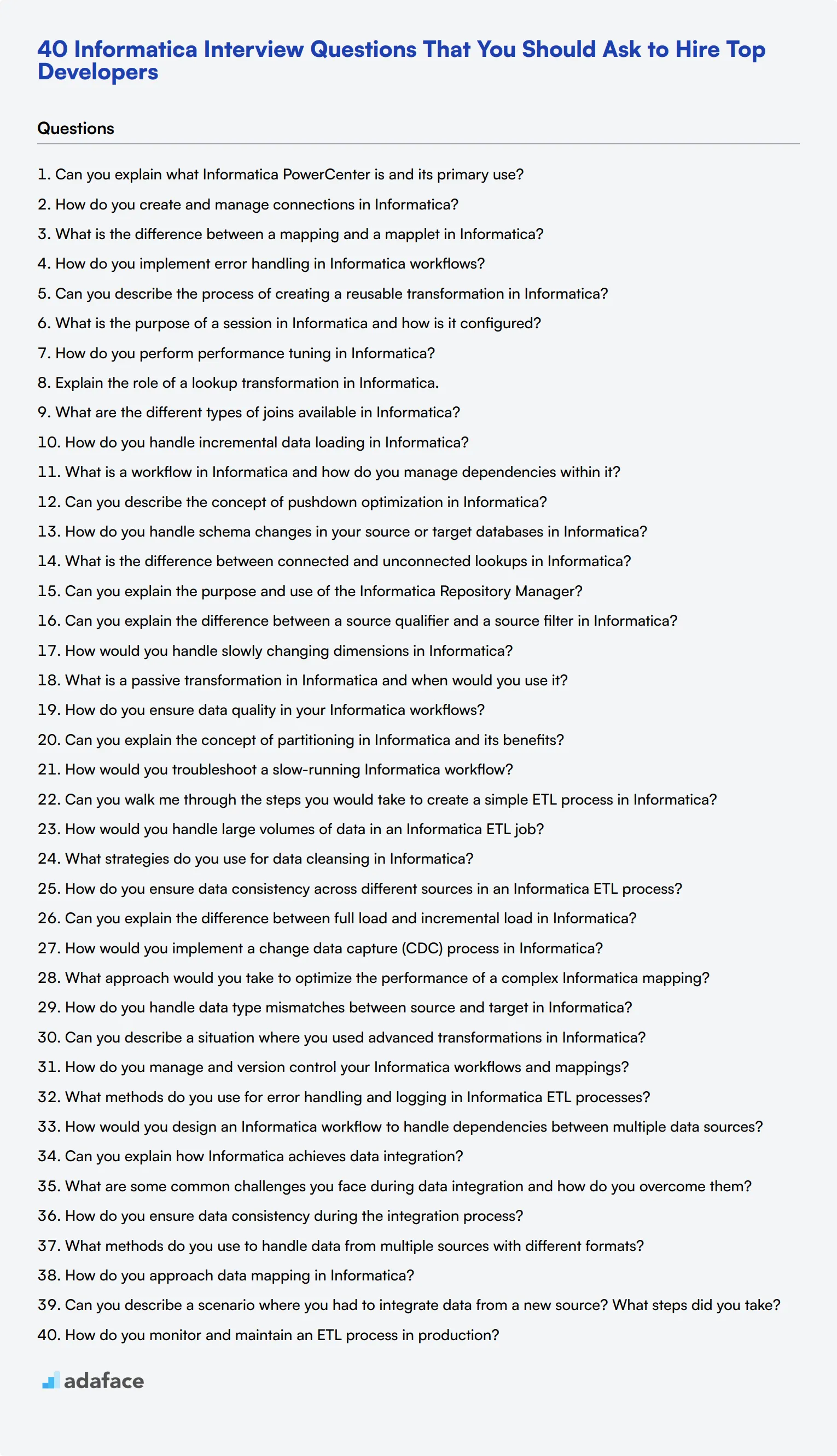Hiring skilled Informatica developers is crucial for organizations looking to harness the power of data integration and ETL processes. Asking the right interview questions can help you identify top talent and ensure you're bringing the best candidates on board.
This blog post provides a comprehensive list of Informatica interview questions, covering basic concepts, junior developer assessments, ETL processes, and data integration. We've organized these questions into four sections to help you evaluate candidates at different experience levels and for various aspects of Informatica development.
By using these questions, you can effectively assess candidates' Informatica skills and make informed hiring decisions. Consider complementing your interviews with pre-employment assessments to get a more holistic view of candidates' abilities.
Table of contents
15 basic Informatica interview questions and answers to assess applicants

To determine whether your applicants have the right skills to excel as Informatica developers, ask them some of these 15 basic Informatica interview questions. This list will help you gauge their understanding of key concepts and their ability to handle tasks typical of an Informatica developer.
- Can you explain what Informatica PowerCenter is and its primary use?
- How do you create and manage connections in Informatica?
- What is the difference between a mapping and a mapplet in Informatica?
- How do you implement error handling in Informatica workflows?
- Can you describe the process of creating a reusable transformation in Informatica?
- What is the purpose of a session in Informatica and how is it configured?
- How do you perform performance tuning in Informatica?
- Explain the role of a lookup transformation in Informatica.
- What are the different types of joins available in Informatica?
- How do you handle incremental data loading in Informatica?
- What is a workflow in Informatica and how do you manage dependencies within it?
- Can you describe the concept of pushdown optimization in Informatica?
- How do you handle schema changes in your source or target databases in Informatica?
- What is the difference between connected and unconnected lookups in Informatica?
- Can you explain the purpose and use of the Informatica Repository Manager?
6 Informatica interview questions and answers to evaluate junior developers
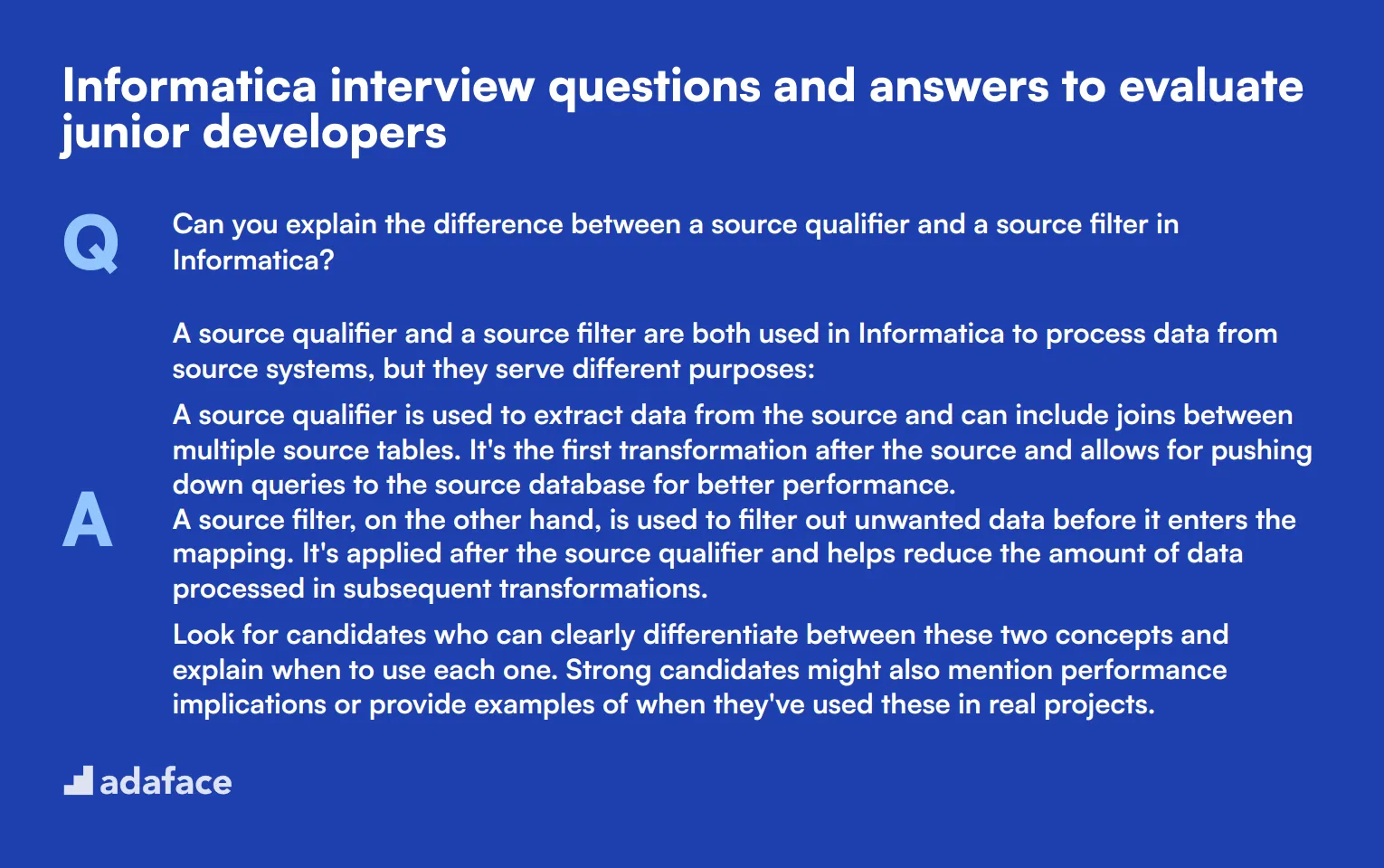
Ready to evaluate junior Informatica developers? These questions will help you assess their foundational knowledge and problem-solving skills. Use this list to gauge candidates' understanding of key concepts and their ability to apply them in real-world scenarios. Remember, the goal is to find someone who can grow and learn within your organization.
1. Can you explain the difference between a source qualifier and a source filter in Informatica?
A source qualifier and a source filter are both used in Informatica to process data from source systems, but they serve different purposes:
- A source qualifier is used to extract data from the source and can include joins between multiple source tables. It's the first transformation after the source and allows for pushing down queries to the source database for better performance.
- A source filter, on the other hand, is used to filter out unwanted data before it enters the mapping. It's applied after the source qualifier and helps reduce the amount of data processed in subsequent transformations.
Look for candidates who can clearly differentiate between these two concepts and explain when to use each one. Strong candidates might also mention performance implications or provide examples of when they've used these in real projects.
2. How would you handle slowly changing dimensions in Informatica?
Handling slowly changing dimensions (SCDs) in Informatica involves capturing and maintaining historical data changes. The approach depends on the type of SCD being implemented:
- For Type 1 SCD: Overwrite the existing record with new data.
- For Type 2 SCD: Create a new record for each change, using effective dates to track validity.
- For Type 3 SCD: Add new columns to store previous values alongside current ones.
A strong candidate should be able to explain the implementation steps for at least one type of SCD, such as using Update Strategy transformation for Type 1 or Slowly Changing Dimension transformation for Type 2. They might also mention the importance of surrogate keys and how to handle them in SCDs.
3. What is a passive transformation in Informatica and when would you use it?
A passive transformation in Informatica is a type of transformation that doesn't change the number of rows in the data flow. It operates on a row-by-row basis, modifying or adding columns without affecting the row count. Common examples include:
- Expression Transformation
- Lookup Transformation
- Router Transformation
Candidates should explain that passive transformations are used when you need to modify data without altering the structure of the dataset. For instance, you might use an Expression Transformation to calculate a new column based on existing ones, or a Lookup Transformation to enrich data with information from another source. Look for answers that demonstrate an understanding of when to choose passive over active transformations for efficient data processing.
4. How do you ensure data quality in your Informatica workflows?
Ensuring data quality in Informatica workflows involves several strategies:
- Use of Data Validation Transformation to check for data integrity and apply business rules
- Implementing error handling and logging mechanisms to capture and report issues
- Utilizing Lookup and Joiner transformations to ensure data consistency across sources
- Applying data cleansing techniques such as standardization and deduplication
- Regular monitoring and auditing of data loads
A strong candidate should be able to discuss their experience with these techniques and provide examples of how they've implemented them in real projects. They might also mention the importance of working closely with business stakeholders to define and refine data quality rules over time.
5. Can you explain the concept of partitioning in Informatica and its benefits?
Partitioning in Informatica is a technique used to improve performance by dividing large datasets into smaller, more manageable chunks that can be processed in parallel. There are several types of partitioning:
- Source partitioning: Divides data at the source level
- Target partitioning: Splits data when writing to the target
- Hash partitioning: Distributes data based on a hash algorithm
- Round-robin partitioning: Evenly distributes data across partitions
Benefits of partitioning include improved performance, better scalability, and more efficient use of system resources. Look for candidates who can explain how partitioning works and provide examples of when they've used it to optimize ETL processes. Strong candidates might also discuss considerations for choosing the right partitioning strategy based on data characteristics and system architecture.
6. How would you troubleshoot a slow-running Informatica workflow?
Troubleshooting a slow-running Informatica workflow involves a systematic approach:
- Analyze session logs to identify bottlenecks or errors
- Check system resources (CPU, memory, disk I/O) for constraints
- Review the workflow design for inefficiencies
- Examine source and target systems for performance issues
- Use Informatica's performance tuning features like partitioning or caching
- Consider optimizing SQL queries in Source Qualifier transformations
A strong candidate should be able to walk through these steps and provide examples of how they've applied them in real scenarios. They might also mention tools like Informatica Monitor or third-party monitoring solutions they've used for performance analysis. Look for answers that demonstrate a methodical approach to problem-solving and a deep understanding of Informatica's architecture.
12 Informatica questions related to ETL processes
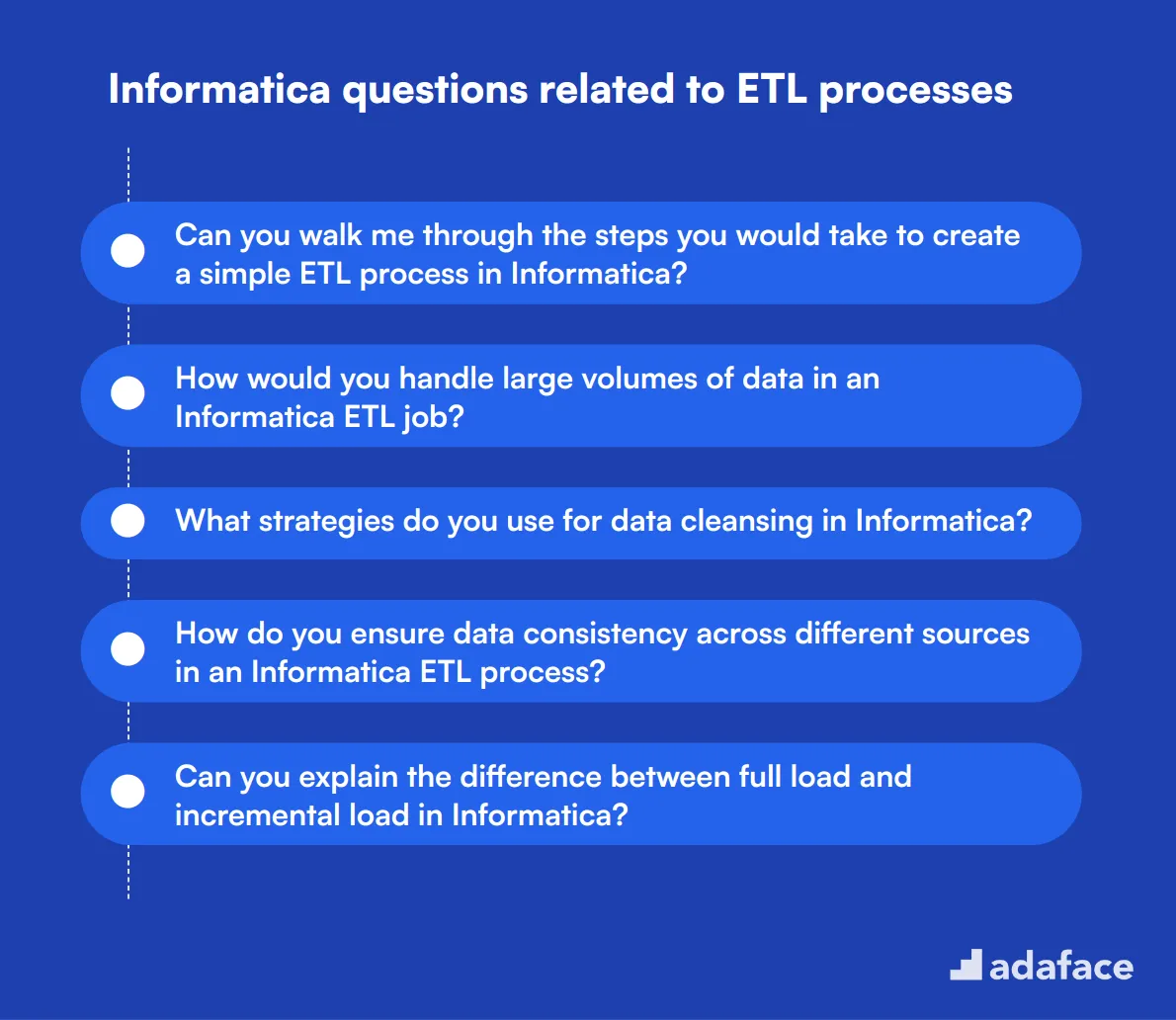
To assess a candidate's proficiency in ETL processes using Informatica, consider asking these questions during your interview. They cover key aspects of data extraction, transformation, and loading, helping you gauge the applicant's practical knowledge and problem-solving skills.
- Can you walk me through the steps you would take to create a simple ETL process in Informatica?
- How would you handle large volumes of data in an Informatica ETL job?
- What strategies do you use for data cleansing in Informatica?
- How do you ensure data consistency across different sources in an Informatica ETL process?
- Can you explain the difference between full load and incremental load in Informatica?
- How would you implement a change data capture (CDC) process in Informatica?
- What approach would you take to optimize the performance of a complex Informatica mapping?
- How do you handle data type mismatches between source and target in Informatica?
- Can you describe a situation where you used advanced transformations in Informatica?
- How do you manage and version control your Informatica workflows and mappings?
- What methods do you use for error handling and logging in Informatica ETL processes?
- How would you design an Informatica workflow to handle dependencies between multiple data sources?
7 Informatica interview questions and answers related to data integration
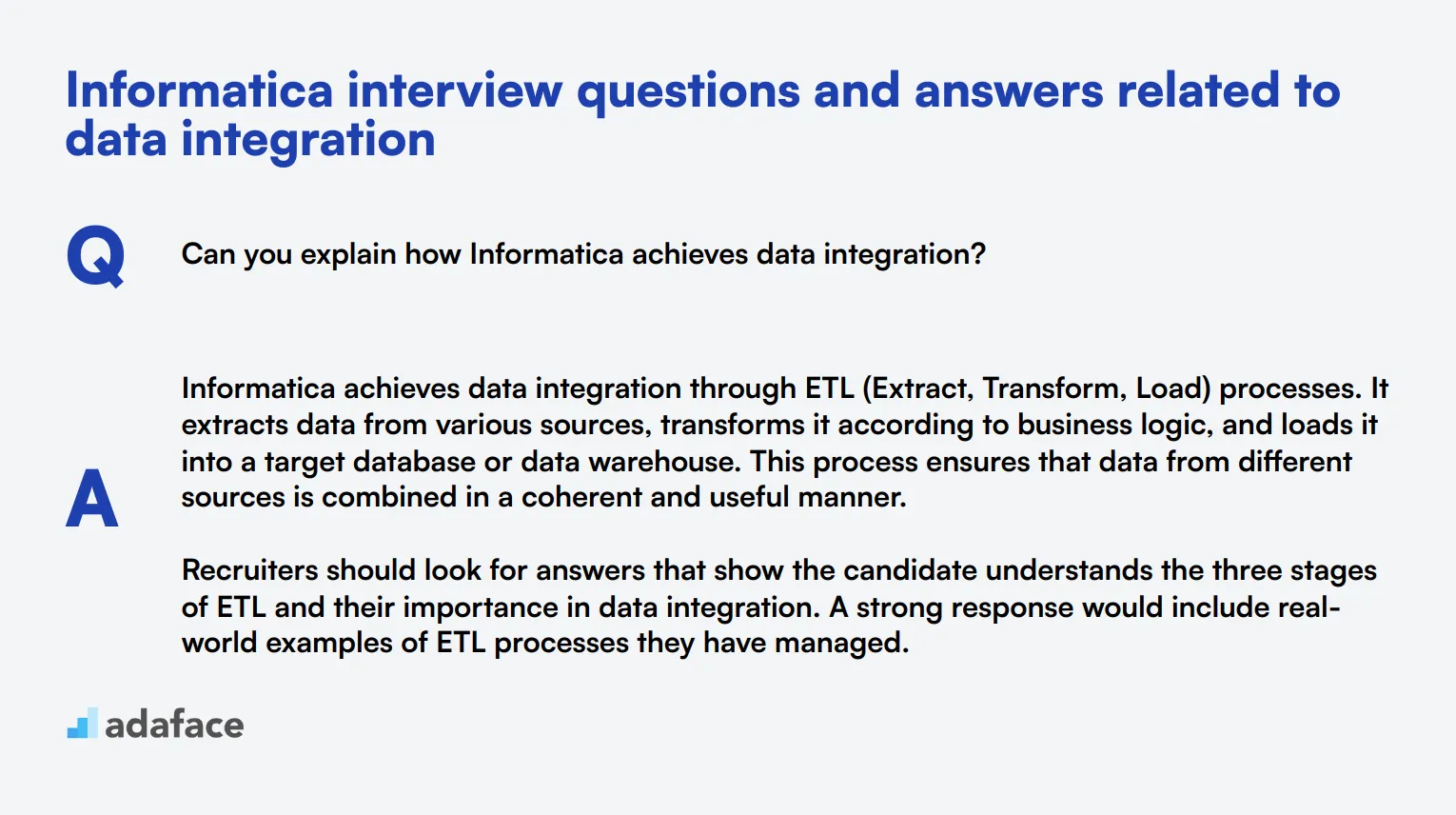
To ensure your candidates have the essential skills for data integration tasks using Informatica, use these carefully selected interview questions. They will help you gauge the depth of their understanding and practical experience.
1. Can you explain how Informatica achieves data integration?
Informatica achieves data integration through ETL (Extract, Transform, Load) processes. It extracts data from various sources, transforms it according to business logic, and loads it into a target database or data warehouse. This process ensures that data from different sources is combined in a coherent and useful manner.
Recruiters should look for answers that show the candidate understands the three stages of ETL and their importance in data integration. A strong response would include real-world examples of ETL processes they have managed.
2. What are some common challenges you face during data integration and how do you overcome them?
Some common challenges in data integration include data quality issues, handling different data formats, and managing large volumes of data. To overcome these, one can use data profiling tools to assess data quality, employ standardized data formats, and utilize partitioning and parallel processing for large datasets.
Candidates should demonstrate their problem-solving skills and provide examples of how they've tackled these challenges in past projects. Look for specifics on the tools and techniques they've used.
3. How do you ensure data consistency during the integration process?
Ensuring data consistency involves using data validation and cleansing techniques during the ETL process. This includes checking for duplicates, validating data against business rules, and using referential integrity constraints.
A strong candidate will also mention the use of data quality tools and practices they follow to maintain data consistency across various sources and targets.
4. What methods do you use to handle data from multiple sources with different formats?
To handle data from multiple sources with different formats, I use data transformation tools within Informatica to convert data into a common format. This might include data type conversions, standardizing date formats, and normalizing data.
Candidates should provide examples of specific transformations they've performed and discuss any challenges they faced in harmonizing data formats.
5. How do you approach data mapping in Informatica?
Data mapping in Informatica involves defining how the data fields from the source are transformed and loaded into the target. This includes specifying the source and target fields, transformation logic, and any business rules that need to be applied.
Look for candidates who can explain their approach to creating and validating data mappings and who can provide examples of complex mappings they have successfully implemented.
6. Can you describe a scenario where you had to integrate data from a new source? What steps did you take?
When integrating data from a new source, the first step is to understand the source system and its data structure. Then, I would configure a new source connection in Informatica, create mappings to transform the data, and validate the data quality before loading it into the target system.
An ideal answer will include detailed steps the candidate took and any challenges they encountered, along with how they resolved these issues.
7. How do you monitor and maintain an ETL process in production?
Monitoring an ETL process involves setting up alerts and logs to track the success and failure of workflows. Regular maintenance includes checking for system performance, ensuring data accuracy, and making necessary updates to the ETL processes.
Candidates should mention specific tools and practices they use for monitoring, such as performance tuning and load balancing, as well as their approach to troubleshooting issues that arise in production environments.
Which Informatica skills should you evaluate during the interview phase?
In an Informatica interview, it's important to recognize that you cannot assess every aspect of a candidate's abilities in a single interaction. However, certain skills are particularly integral to their capability to succeed in the role. Evaluating these core competencies can provide valuable insight into the candidate's suitability.
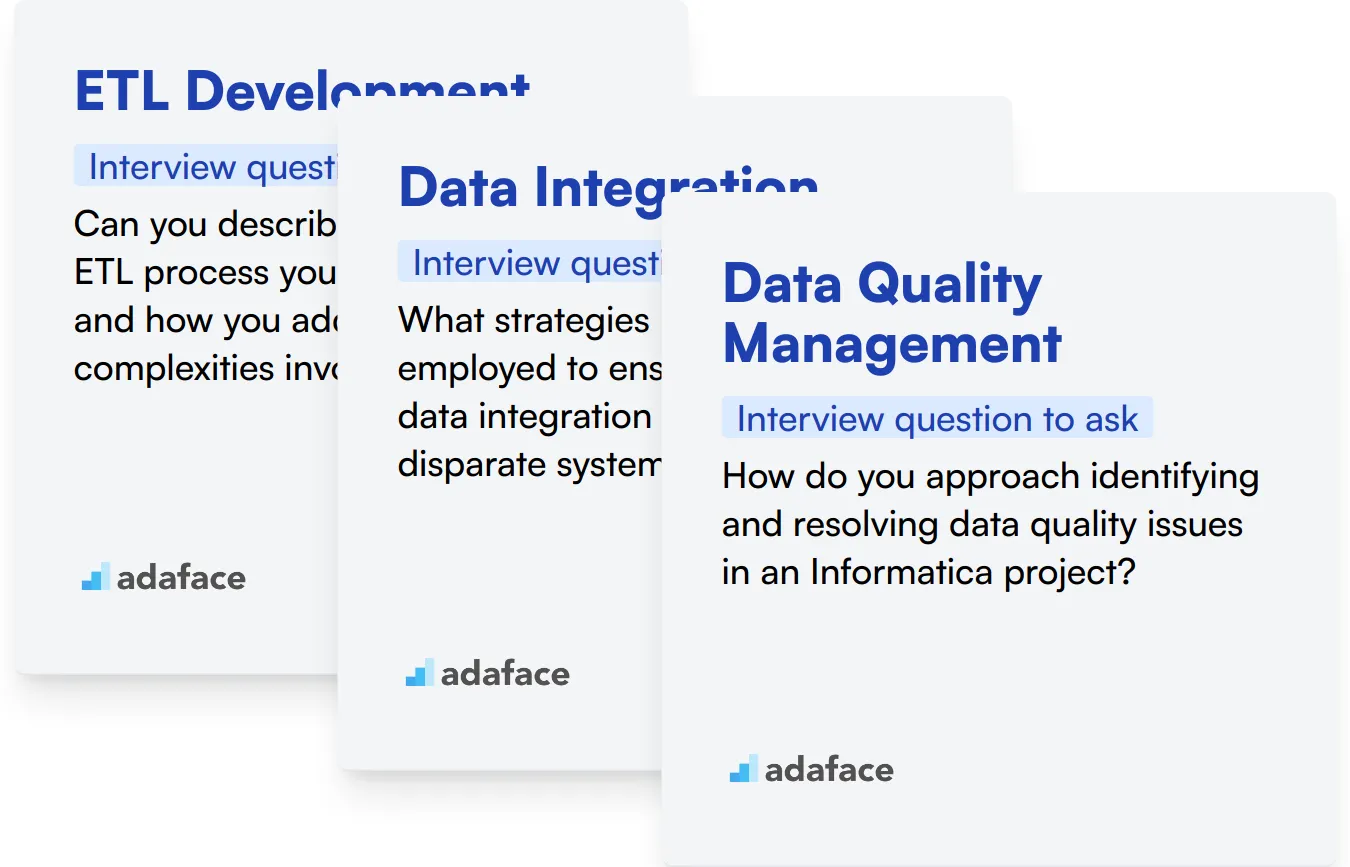
ETL Development
To filter for this skill, consider using an assessment test that includes relevant MCQs on ETL development. These questions can help gauge the candidate's theoretical knowledge and practical understanding.
Additionally, you may want to ask targeted interview questions related to ETL development to further assess their expertise.
Can you describe a challenging ETL process you implemented and how you addressed the complexities involved?
When asking this question, look for specific examples that highlight problem-solving skills, creativity in approach, and the candidate's ability to handle challenges within ETL processes.
Data Integration
To assess data integration skills, consider an assessment test that includes MCQs focused on integration scenarios. This can reveal the candidate's familiarity with different integration techniques and tools.
You can also ask targeted questions to explore their experience with data integration tasks in depth.
What strategies have you employed to ensure successful data integration between disparate systems?
Listen for answers that reflect a deep understanding of integration challenges, methodologies they used, and successful outcomes resulting from their efforts.
Data Quality Management
Consider using an assessment test focused on data quality management to filter candidates based on their ability to maintain high data standards.
You might want to ask specific questions related to their experiences with data quality to further evaluate their practical knowledge.
How do you approach identifying and resolving data quality issues in an Informatica project?
When the candidate responds, look for their ability to articulate a systematic approach to identifying data quality problems and the methods they applied to resolve them.
Tips for Effective Informatica Interviews
Before putting your new knowledge to use, consider these tips to enhance your Informatica interview process. These strategies will help you make the most of your candidate evaluations.
1. Incorporate Skills Tests in Your Screening Process
Start by using skills tests to objectively assess candidates' Informatica proficiency. This approach helps you identify top talent early in the hiring process.
Consider using an Informatica online test to evaluate core competencies. Additionally, an ETL online test can assess related skills critical for Informatica roles.
Implementing these tests allows you to focus your interviews on the most promising candidates. It also provides talking points for more in-depth discussions during the interview stage.
2. Prepare a Balanced Set of Interview Questions
With limited interview time, it's crucial to ask the right questions. Compile a mix of technical and practical Informatica questions to cover various aspects of the role.
Consider including questions about data warehousing and SQL to assess broader data management skills. You might also want to explore candidates' problem-solving abilities with scenario-based questions.
Don't forget to assess soft skills like communication and teamwork, which are important for success in any technical role.
3. Master the Art of Follow-Up Questions
Asking follow-up questions is key to understanding a candidate's true depth of knowledge. It helps you distinguish between those who have memorized answers and those with genuine expertise.
For example, after asking about PowerCenter components, follow up with a question about how they've optimized workflow performance. This approach reveals practical experience and problem-solving skills in real-world scenarios.
Use Informatica interview questions and skills tests to hire talented developers
If you're looking to hire someone with Informatica skills, it's important to ensure they possess those skills accurately. The best way to do this is by using skill tests, such as our Informatica online test to assess their expertise effectively.
Once you've used this test, you can shortlist the best applicants and invite them for interviews. To get started, visit our assessment test library and explore more relevant tests.
Informatica Online Test
Download Informatica interview questions template in multiple formats
Informatica Interview Questions FAQs
Informatica is a software development company that provides tools for data integration. It is important because it allows businesses to efficiently process and manage large volumes of data from various sources.
Look for clear explanations, an understanding of the core concepts, practical knowledge, and how they approach problem-solving.
Ask them about specific ETL projects they have worked on, what challenges they faced, how they overcame them, and any tools they used.
Scenario-based questions help you understand how candidates apply their knowledge in real-world situations, indicating their problem-solving skills and practical experience.
An ideal Informatica developer should have strong skills in data warehousing, ETL processes, SQL, Informatica PowerCenter, and data integration tools.
Prepare a mix of technical, scenario-based, and behavioral questions. Also, consider practical tests or coding assessments to gauge their hands-on skills.

40 min skill tests.
No trick questions.
Accurate shortlisting.
We make it easy for you to find the best candidates in your pipeline with a 40 min skills test.
Try for freeRelated posts
Free resources




